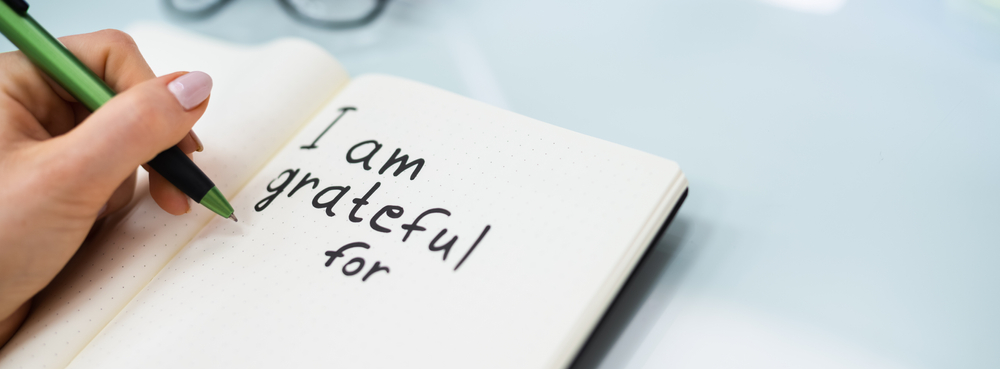Gratitude is a crucial element of the abundance mindset. The Oxford Dictionary defines gratitude as “the quality of being thankful; readiness to show appreciation for and to return kindness.” Most people are capable of at least occasional gratitude when the appropriate situation arises, like when someone gives them an unexpected gift. But the abundance mindset takes gratitude to a whole new and exciting level.
Gratitude must become a regular practice to free your mind. An approach that is undertaken even when the chips are down. Imagine the prisoner on death row who can give thanks for his or her last meal! That person would be a gratitude master.

Science
Science has shown that gratitude has a real impact on our physical and emotional health. Twenty years ago, a groundbreaking research effort spearheaded by psychologist Robert A. Emmons aimed to delve into the advantages of gratitude, a subject that had received limited scientific attention before. Dr. Emmons’ discoveries, which hinted at the potential of gratitude to enhance mental well-being, sparked a wave of subsequent investigations. Up to the present day, multiple studies have confirmed that adopting a grateful perspective, acknowledging one’s blessings, and conveying gratitude to others can yield favorable outcomes for our emotional well-being and for our relationships, both interpersonal and romantic.
In a randomized, controlled study, gratitude was found to improve the mental health of psychotherapy clients. Also, several research studies have indicated that expressing gratitude to acquaintances, colleagues, friends, or romantic partners can provide a positive enhancement to relationships and contribute to strengthening the bond between individuals, as noted by Sara Algoe, a psychologist at the University of North Carolina at Chapel Hill, who has investigated the role of gratitude in relationships.
Journaling
A discipline for practicing gratitude frequently is called a gratitude journal. Gratitude journaling is a method where you maintain a daily diary of things you appreciate. It stands out as one of the widely embraced techniques for cultivating gratitude.
You can kickstart this practice by reflecting on a memorable moment from your day, expressing your feelings about someone special in your life, or jotting down a list of five things you’re thankful for on that particular day.
It doesn’t necessarily require a physical journal; a note on your phone will do just fine. This makes it convenient to swiftly record moments of gratitude as they occur.

Meditation
A meditation routine can incorporate the practice of gratitude as well. You can center your meditation on the things you appreciate, or you might find it more manageable to reflect on the journey that has led you to your current state.
To achieve this, recall your past experiences, both positive and negative, and contemplate the progress you’ve made since then. This places your present circumstances in a meaningful context, allowing you to perceive them clearly and fostering a sense of gratitude for the path that has brought you here.
Morning is often regarded as an ideal time to engage in gratitude meditation, instilling a positive mindset for the day ahead. Alternatively, you can also use this practice to unwind before bedtime.
Spirituality
Look at all of the major contemporary religions. In each case, there is usually a theme of gratitude or thankfulness woven into vital parts of the scriptures. Combining your spiritual or religious beliefs with a gratitude practice can add power and depth. Whether you consider a “higher power” to be God, the Universe, Your Infinite Self, or even Nature, the label doesn’t matter for this purpose. You can reinforce your gratitude by reading the relevant scripture or inspirational words.
Money
This article is about gratitude and abundance, so we would be incomplete if we didn’t cover finances. Giving appreciation for whatever money or resources you have is essential. Even if you can only cover the bare essentials currently, that is cause for profound celebration. Give thanks if you have any of the following:
- A roof over your head.
- Food to eat.
- A body that gets you around.
- People or animals that give you support.
- Money in the bank.
- A mind that functions well enough to read this.
- Employment of some sort.
- Government benefits.
- Transportation.
Understand that the universe works a certain way. If you appreciate what you have, you will be rewarded with more. If you dwell on lack, you see more lack and will be rewarded with more lack. Some may not believe this; you may think it’s “woo-woo.” But you can assume that the human mind will find evidence to fulfill its preconceived beliefs. If you have a scientific bent, study the human reticular activating system in the brain.

Relationships
Practicing appreciation in your mind is fantastic and effective. The result is that you can’t help but express it outwardly. Your expression of gratitude to others can create a ripple effect. The extent of this you can’t even begin to understand. Even with those who bring you apparent difficulty, you may learn to appreciate them for getting you back to your gratitude practice. As an added bonus, if you can thank them directly, it will confound them.
The Workplace
All of the previous sections apply to gratitude in the workplace. Even in a difficult or toxic work environment, gratitude can change things through the ripple effect. Otherwise, it can facilitate the opening of new doors and fresh opportunities.
Giving
Gratitude and the abundance mindset are all about staying in the flow. Both giving and receiving in plentitude and enjoying it all. Being stingy and miserly only impedes the flow. Besides, what is the point of abundance if you can’t share it and enjoy it? Do you have to set boundaries and say no sometimes? Of course, but that can be done gently and with love. Imagine asking Ghandi and Ebenezer Scrooge for a million dollars. Both would say no, but you would probably walk away from one of those encounters with peace. Remember that abundance is about much more than material wealth.
Put Gratitude to the Test
What actually occurs when you enter a state of profound gratitude? I have experienced a shift in perspective and a following change in results. But don’t just take my word for it; try it yourself and see what happens. Try an experiment; choose a period, perhaps one day or one week, and be committed to being in a state of gratitude as much as possible. If you find yourself complaining or in a negative pattern, don’t worry; just try to find appreciation for something about the situation. At the end of the time, stop and assess how you are feeling compared to how you usually feel. Note any other shifts.
Conclusion
As I write this, I feel thankful for my house, my computer, my mind, and all the other influences from across the world. And thankful, most of all, to you, dear reader, for your support.





